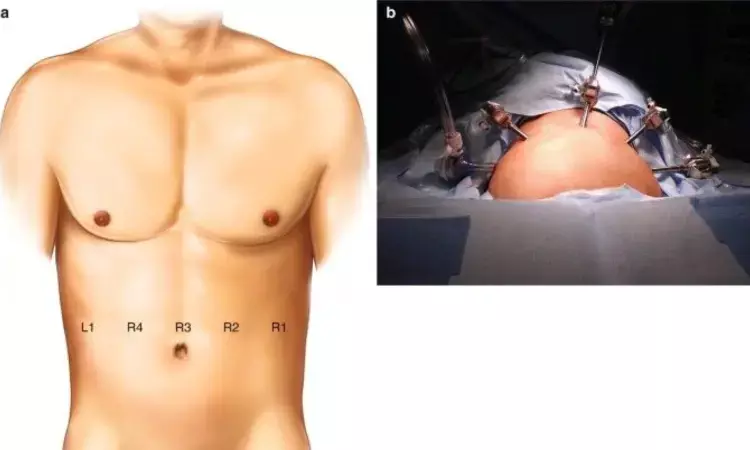- Home
- Medical news & Guidelines
- Anesthesiology
- Cardiology and CTVS
- Critical Care
- Dentistry
- Dermatology
- Diabetes and Endocrinology
- ENT
- Gastroenterology
- Medicine
- Nephrology
- Neurology
- Obstretics-Gynaecology
- Oncology
- Ophthalmology
- Orthopaedics
- Pediatrics-Neonatology
- Psychiatry
- Pulmonology
- Radiology
- Surgery
- Urology
- Laboratory Medicine
- Diet
- Nursing
- Paramedical
- Physiotherapy
- Health news
- Fact Check
- Bone Health Fact Check
- Brain Health Fact Check
- Cancer Related Fact Check
- Child Care Fact Check
- Dental and oral health fact check
- Diabetes and metabolic health fact check
- Diet and Nutrition Fact Check
- Eye and ENT Care Fact Check
- Fitness fact check
- Gut health fact check
- Heart health fact check
- Kidney health fact check
- Medical education fact check
- Men's health fact check
- Respiratory fact check
- Skin and hair care fact check
- Vaccine and Immunization fact check
- Women's health fact check
- AYUSH
- State News
- Andaman and Nicobar Islands
- Andhra Pradesh
- Arunachal Pradesh
- Assam
- Bihar
- Chandigarh
- Chattisgarh
- Dadra and Nagar Haveli
- Daman and Diu
- Delhi
- Goa
- Gujarat
- Haryana
- Himachal Pradesh
- Jammu & Kashmir
- Jharkhand
- Karnataka
- Kerala
- Ladakh
- Lakshadweep
- Madhya Pradesh
- Maharashtra
- Manipur
- Meghalaya
- Mizoram
- Nagaland
- Odisha
- Puducherry
- Punjab
- Rajasthan
- Sikkim
- Tamil Nadu
- Telangana
- Tripura
- Uttar Pradesh
- Uttrakhand
- West Bengal
- Medical Education
- Industry
Laparoscopic ventral mesh rectopexy and transperineal mesh repair both effectively relieve constipation symptoms due to obstructed defecation syndrome

Laparoscopic ventral mesh rectopexy and transperineal mesh repair equally effective for relieving constipation symptoms due to obstructed defecation syndrome suggests a new study published in the BMC surgery
Obstructed defecation syndrome represents 50–60% of patients with symptoms of constipation. We aimed to compare the two frequently performed surgical methods, laparoscopic ventral mesh rectopexy and transperineal mesh repair, for this condition in terms of functional and surgical outcomes.
This study is a retrospective review of 131 female patients who were diagnosed with obstructed defecation syndrome, attributed to rectocele with or without rectal intussusception, enterocele, hysterocele or cystocele, and who underwent either laparoscopic ventral mesh rectopexy or transperineal mesh repair. Patients were evaluated for surgical outcomes based on the operative time, the length of hospital stay, operative complications, using prospectively designed charts. Functional outcome was assessed by using the Initial Measurement of Patient-Reported Pelvic Floor Complaints Tool.
Results
Fifty-one patients diagnosed with complex rectocele underwent laparoscopic ventral mesh rectopexy, and 80 patients diagnosed with simple rectocele underwent transperineal mesh repair. Mean age was found to be 50.35 ± 13.51 years, and mean parity 2.14 ± 1.47. Obstructed defecation symptoms significantly improved in both study groups, as measured by the Colorectal Anal Distress Inventory, Constipation Severity Instrument and Patient Assessment of Constipation-Symptoms scores. Minor postoperative complications including wound dehiscence (n = 3) and wound infection (n = 2) occurred in the transperineal mesh repair group.
Laparoscopic ventral mesh rectopexy and transperineal mesh repair are efficient and comparable techniques in terms of improvement in constipation symptoms related to obstructed defecation syndrome. A selective distribution of patients with or without multicompartmental prolapse to one of the treatment arms might be the preferred strategy.
Reference:
Balci, B., Leventoglu, S., Osmanov, I. et al. Laparoscopic ventral mesh rectopexy vs. transperineal mesh repair for obstructed defecation syndrome associated with rectocele: comparison of selectively distributed patients. BMC Surg 23, 359 (2023). https://doi.org/10.1186/s12893-023-02206-0
Keywords:
Laparoscopic, ventral, mesh, rectopexy, transperineal, mesh, repair, equally, effective, relieving, constipation, symptoms, due, obstructed, defecation, syndrome, BMC surgery, Balci, B., Leventoglu, S., Osmanov, I.
Dr. Shravani Dali has completed her BDS from Pravara institute of medical sciences, loni. Following which she extensively worked in the healthcare sector for 2+ years. She has been actively involved in writing blogs in field of health and wellness. Currently she is pursuing her Masters of public health-health administration from Tata institute of social sciences. She can be contacted at editorial@medicaldialogues.in.
Dr Kamal Kant Kohli-MBBS, DTCD- a chest specialist with more than 30 years of practice and a flair for writing clinical articles, Dr Kamal Kant Kohli joined Medical Dialogues as a Chief Editor of Medical News. Besides writing articles, as an editor, he proofreads and verifies all the medical content published on Medical Dialogues including those coming from journals, studies,medical conferences,guidelines etc. Email: drkohli@medicaldialogues.in. Contact no. 011-43720751


